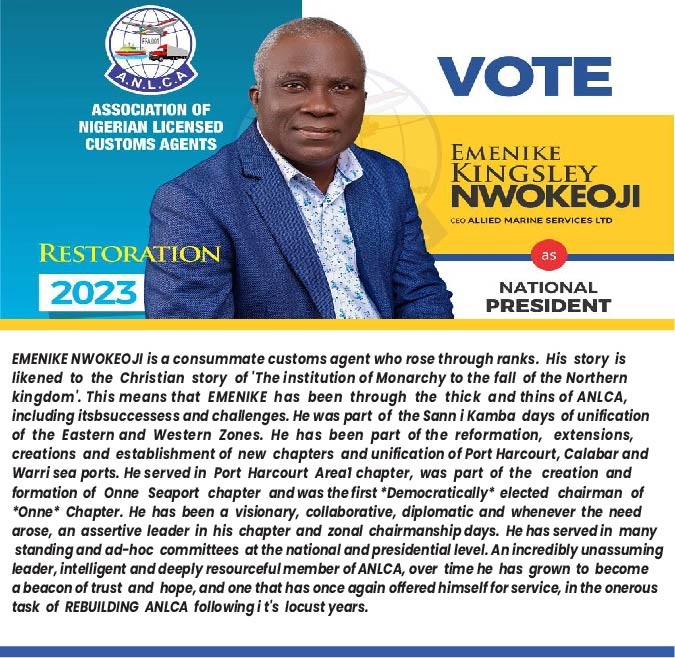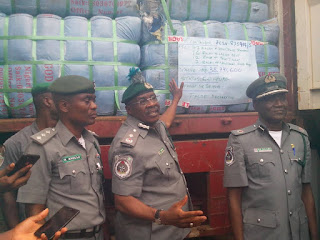Customs Strike Force: How latest enhancement policy somersaulted
Confusion has hit the leadership and management of the Nigeria Customs Service, NCS, over perceived failure of its recent policy adjustment into the operational modus operandi of the Headquarters Strike Force, the service’s elitist enforcement unit.
The immediate backlash of the failed policy saw the National Coordinator of the Headquarters Strike Force, Deputy Comptroller Abdullahi Kirawa with his team sacked three weeks ago, while the unit was decentralized and reconstituted on regional basis.
The strike force operational adjustment which followed a directive of Col. Hameed Ali, Retired, the Comptroller General of Customs, for the Strike Force to also enter the ports to checkmate smuggling and curb further loses of revenue was however adjudged a failed venture following fierce resistance by forces within and without the service.
Grapevine revealed that the failed policy was largely the result of intrigues and power play between contending power interests in the service and the office of the comptroller general. It started with what insiders referred to as the ill advised decision to extend the intervention of the unit into the ports, a decision that those whose business it is to know say “was not only an act of vote of no confidence on the area controllers, but also more or less an attempt to render the area controllers redundant.”
“With the circular putting seal to the authority of the strike force to enter into the port, the CGC immediately exposed the unit and its leadership to attack, to enmity and even, to harm. The former national coordinator and his zonal commanders should even be happy about the timely scrapping of the national unit; they may have been faced with stiffer and messier times like getting roped into acts of corruption and even more sinister developments.”
Industry observers and analysts expressed misgiving that Ali being a military man should have foreseen the unnecessary bickering and bad blood such policy decision would throw up in the system, apart from apparently over policing the port trade, evidenced by importers, clearing agents and associated organizations outcry, which trailed the announcement of the short-lived policy statement.
Others have also argued that Ali not been a commissioned customs officer and therefore not versed in the grand norm of its operational technicalities may have been a victim of divisive interests, both at the headquarters and beyond; of interests who are unconcerned and or even inclined to look on while the CGC slips over the precipice.
Others who spoke on the development said while there may be a select few genuinely disposed to working with the customs boss and showing him points of pitfalls, Ali may have assumed he has a grasp of the service’s operational procedures, and feel free to dispense with both advice and actions.
Since there are several possibilities to this policy default, one cannot exhaust the theories of who provided the wrong ammunition that has spilled out fluid instead of fire. Tail or head, this is a singular policy somersault that Ali must be willing to accept full responsibility.
Meanwhile, stakeholders have counseled that under normal circumstances, the best option for the customs boss in the atmosphere of distrust as the current development suggests was for him to resign. Chieftains of the Association of Nigeria Licensed Customs Agents and that of All Ports Unified Freight Forwarding Practitioners Association said changes in the headship of enforcements units without commensurate sanctions against officers deemed to have compromised does not have any prospect for better trade facilitation in the future, or guarantee the required work ethics that punishes anti-trade behaviour and compromises.
Resistance to the directive which became strident with calls by some stakeholders on President Muhammadu Buhari to call Ali to order was believed to have sparked confusion and apprehension at the customs headquarters. Reliable insider sources informed our reporter that the development forced management into a number of emergency meetings; the last of which a decision was taken to embark on face saving measure for the management as well find a soft landing for the customs boss, who came under very harsh attack by ports operators over the apparently unpopular directive.
To further diffuse the confusion, management also made major reversal in the controversial operational policies, by hurriedly dissolving and reconstituting the strike force under whose purview the contentious directives were supposed to have been implemented.
The announcement of the dissolution contained in a fresh circular which was also signed by the Deputy Comptroller General in charge of Enforcement, Investigation and Inspection, DCG Augustine Chidi on behalf of Ali, said the reconstituted Strike Force has been dissolved and reconstructed into three zonal arrangements, with each zone to be headed by a Deputy Comptroller of Customs.
Under the new arrangement, Deputy Comptroller Usman Biri Yahaya was appointed to head Zone A Lagos, Deputy Comptroller Kolobe B. to head Zone B Kaduna, with Deputy Comptroller Adamu A. M drafted to take charge of Zone C Owerri. The statement was silent on Zone D which has hitherto, been part of customs administrative structure and zonal arrangement. But that is story for another day.
Commenting on the development, President of APUFFPA, Prince Mike Okorie said, “It does not make any sense to say the strike force has been reconstituted. It is duplicating the job of enforcement units of the commands, of customs intelligence unit, CIU, and federal operations unit, FOU. All these are duplications, and each time there are issues, the CG makes changes, that shouldn’t be the approach, because the new heads would be changed anytime soon too. It shows that the CG is not effectively in charge and he should resign.
“The CG cannot continue to lament that there is smuggling and leakages where he has all these groups everywhere. If he is saying he cannot trust his officers, that he has no confidence in them, he should make a clean sweep or resign.”
On his part, National Publicity Secretary of ANLCA, Mr. Joe Sanni suggested a deterrence approach to the matter through genuine sanctions.
His words, “There are three issues at stake that needs to be addressed urgently in this back and forth tangoing within and outside Nigeria Customs Service. Customs must now begin to sanction its defaulting officers for such lapses to deter others, reward honest import/export/declarations for compliance, and put defaulting importers/exporters out of business, withdraw licenses of collaborating Customs Brokers/Agents, after due diligence/process, to establish facts behind the acts.”
Personnel at the customs public relations office declined to speak on the fate of the earlier directive empowering the strike force to enter into the port. But a senior officer who spoke in with our reporter in confidence said the situation is still hazy.
“My brother, you will agree that there is a general atmosphere of confusion in the system, particularly on this strike force matter. So I cannot tell you whether that directive is enduring or not. Let us wait and see what happens”, he said.
Those whose business it is to know argue that the earlier directive merely created unnecessary trouble for the defunct strike force and its leader. They blame Ali and his management team for putting the strike force under pressure, and creating enemy for it and its leaders.
According to a source, “When you empower a strike force to enter into a command with a constituted command structure to take action over cargo and cases under th command authority, you are creating enmity between both.
“The strike force by virtue of its mandate is already surrounded by enemies, to say it should also go and do oversight on the activities of the command is simply putting the man at the helm of the strike force under attack, under suicide mission. His enemies doubled overnight, he was even lucky to have been removed, they could plot his downfall using every sinister means, they could rope him and his deputies into problems, the port system is deadly. This policy is a very wrong, unjust and poorly thought out policy.”
Pinnacle Time gathered authoritatively that during the emergency meetings at Abuja where Ali urged officers to speak freely, many blamed the strike force for concentrating too much on the ports while rice was freely coming in from the hinterland and waterways. This was said to have again changed the mood of the CGC, who had barely three weeks ordered the strike force to show more presence at the seaports. It was amid this confusion that the decision to dissolve the former strike force was adopted.
The dissolved Strike Force made seizures worth over N17b in Duty Paid Value, in addition to recovering over N1b this year vide issuance of demand notices, for consignments with underpaid duties.







